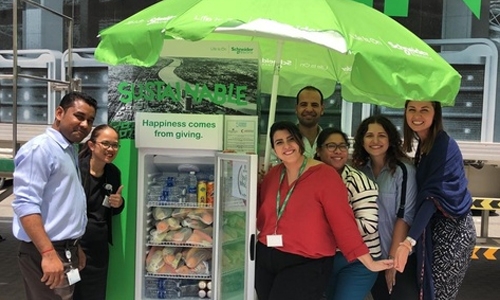The spirit of Ramadan extends to sharing fridges
It’s nearly half way through the holy month and I am already feeling pangs of food-related guilt. This is the reality of Ramadan, as leftovers from previous iftars build up and languish in fridges, quickly discarded as thoughts turn to the next decadent evening meal, which will itself most likely be consigned to scraps, long-forgotten at the back of a fridge shelf. And so the cycle repeats itself, 30 times over.
There are no doubt millions of fridges like this around the world, thanks to a global Ramadan food culture that focuses on big, freshly cooked, expansive banquets, lavish hospitality for guests, lots of takeaway goodies and treats and mounds of rich food. These are understandable: we are all human and after a long day’s fasting, in a month that is underpinned by community and togetherness, people want to enjoy one of the highlights of Ramadan with family and friends.
However, this kind of Ramadan experience comes at a price: excessive and appalling amounts of food waste. Ramadan should be a time when we stop focusing on food. By fasting from dawn until dusk and abstaining from any food or drink during daylight hours, we aim to be mindful of those who have far less than we do around the world. The hunger pangs that prick our stomachs act as reminders for our collective conscience of the millions globally who struggle to feed themselves or their families. Some of them might live much closer than we think, perhaps even in our own communities.
The children of those families might share a classroom with our children. Despite the exhortations about being more conscientious during Ramadan, the most shocking thing is that food waste actually rises during the holy month. Those small packages of leftovers in the fridge, the half-eaten dishes in restaurants and those varied tasters of multiple cuisines at iftar might feel like the perks of the month but they add up to a mountain of food waste. According to the UAE Food Bank project, leftover food waste is expected to go up from an average of 2.7 kilograms per person daily to 4.5kg during Ramadan.
The situation in Malaysia is similar, where wastage rises by a third from 15,000 tonnes per week to 20,000 tonnes. This is likely to be replicated wherever Ramadan is being observed by a large Muslim population. We need to start recognising the dissonance between what we say Ramadan is, and what we actually do during those 30 days. That doesn’t have to mean an end to the Ramadan spirit. Instead, it is about a mindset change and small, practical adjustments we instigate in our homes. It’s about how we plan, cook and share food.
Take the amount of time spent preparing. A study by market research firm AMRB found that nearly twice as much time was spent cooking during Ramadan than at any other time of year and that there was a 43 per cent increase in the number of dishes prepared at home during the month. The answer? Expect fewer dishes on the table, spend less time preparing them and repurpose leftovers where possible. This would reduce the burden on whoever carries the responsibility for cooking and slash food waste. Planning ahead and realistic expectations are key.
Food waste also means environmental waste, with plastics and packaging adding up too. By buying less, this can also be reduced. Fundamentally, the answer is rooted in Ramadan traditions that already exist: share with those who really need the food. The increase in the amount given to charity during the month of fasting is testament to people’s generosity and open-heartedness. It’s also the key to re-thinking how we share our iftars.
Instead of having excessive meals on our own, we can think about how to distribute it. Initiatives like the Ramadan Sharing Fridges scheme in the UAE, where people can leave cooked food, fresh fruit and vegetables and drinks, so those in need can help themselves, is a beautiful example of a community sustaining itself and cutting back on waste. In fact, to make it even easier this year, ride-hailing app firm Careem will even come and collect food from your door to deliver to the fridges.
A bit of planning ahead means that one meal and one simple act from a kind soul can bring joy to a lot more people – and isn’t that the true essence of Ramadan?
Related Posts

